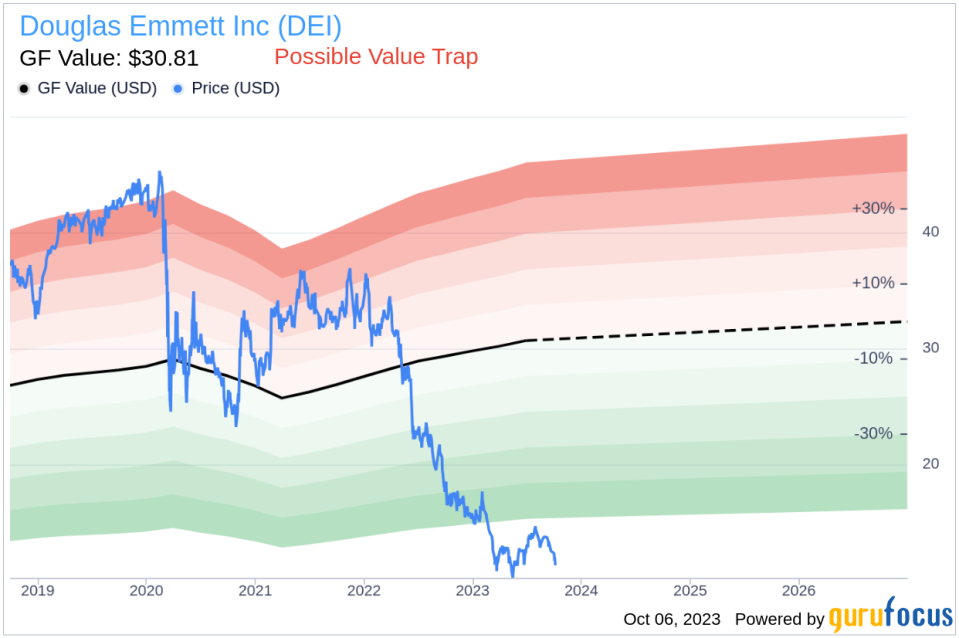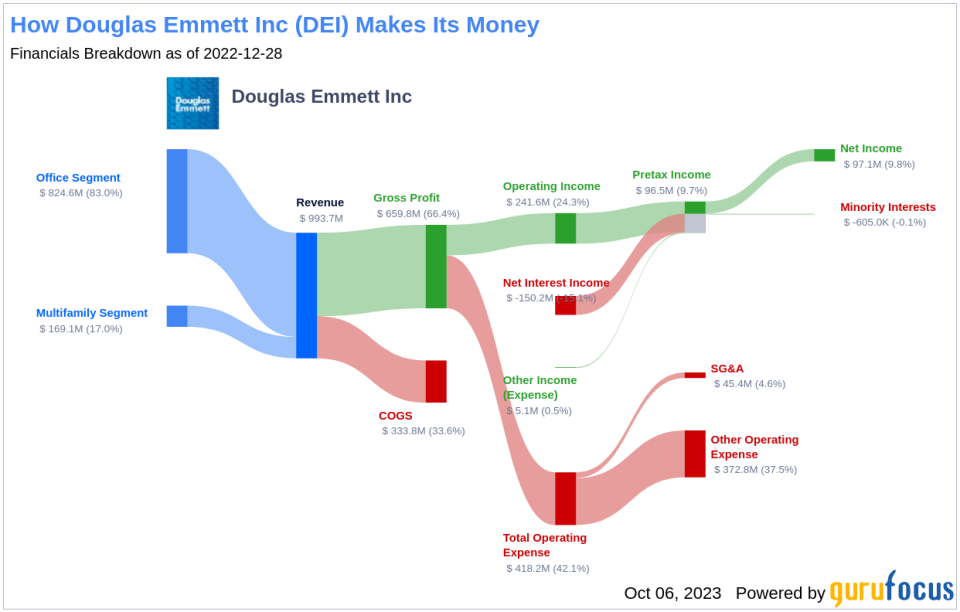Is Douglas Emmett (DEI) Too Good to Be True? A Comprehensive Analysis of a Potential Value Trap
Value-focused investors are always on the hunt for stocks that are priced below their intrinsic value. One such stock that merits attention is Douglas Emmett Inc (NYSE:DEI). The stock, currently priced at $11.55, recorded a loss of 5.25% in a day and a 3-month decrease of 7.29%. The stock's fair valuation is $30.81, as indicated by its GF Value.
Understanding GF Value
The GF Value represents the current intrinsic value of a stock derived from our exclusive method. The GF Value Line on our summary page gives an overview of the fair value that the stock should be traded at. It is calculated based on historical multiples (PE Ratio, PS Ratio, PB Ratio and Price-to-Free-Cash-Flow) that the stock has traded at, GuruFocus adjustment factor based on the company's past returns and growth, and future estimates of the business performance.
We believe the GF Value Line is the fair value that the stock should be traded at. If the stock price is significantly above the GF Value Line, it is overvalued and its future return is likely to be poor. On the other hand, if it is significantly below the GF Value Line, its future return will likely be higher.
Unpacking the Risk Factors
However, investors need to consider a more in-depth analysis before making an investment decision. Despite its seemingly attractive valuation, certain risk factors associated with Douglas Emmett should not be ignored. These risks are primarily reflected through its low Altman Z-score of 0.26. These indicators suggest that Douglas Emmett, despite its apparent undervaluation, might be a potential value trap. This complexity underlines the importance of thorough due diligence in investment decision-making.
Decoding the Altman Z-Score
Before delving into the details, let's understand what the Altman Z-score entails. Invented by New York University Professor Edward I. Altman in 1968, the Z-Score is a financial model that predicts the probability of a company entering bankruptcy within a two-year time frame. The Altman Z-Score combines five different financial ratios, each weighted to create a final score. A score below 1.8 suggests a high likelihood of financial distress, while a score above 3 indicates a low risk.
Inside Douglas Emmett Inc
Douglas Emmett Inc is a real estate investment trust that acquires, develops, and manages office and multifamily properties in Los Angeles, California and Honolulu, Hawaii in the U.S. The company focuses on owning assets in communities with large supply constraints, such as the affluent neighborhoods of Los Angeles. The vast majority of Douglas Emmett's real estate portfolio is comprised of office buildings in Los Angeles.
Douglas Emmett's Low Altman Z-Score: A Breakdown of Key Drivers
A dissection of Douglas Emmett's Altman Z-score reveals Douglas Emmett's financial health may be weak, suggesting possible financial distress.
Conclusion: A Value Trap?
In conclusion, despite its attractive valuation, Douglas Emmett might be a potential value trap due to its low Altman Z-Score. This highlights the importance of conducting thorough due diligence before making an investment decision.
GuruFocus Premium members can find stocks with high Altman Z-Score using the following Screener: Walter Schloss Screen .
This article, generated by GuruFocus, is designed to provide general insights and is not tailored financial advice. Our commentary is rooted in historical data and analyst projections, utilizing an impartial methodology, and is not intended to serve as specific investment guidance. It does not formulate a recommendation to purchase or divest any stock and does not consider individual investment objectives or financial circumstances. Our objective is to deliver long-term, fundamental data-driven analysis. Be aware that our analysis might not incorporate the most recent, price-sensitive company announcements or qualitative information. GuruFocus holds no position in the stocks mentioned herein.
This article first appeared on GuruFocus.


